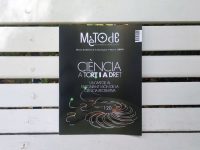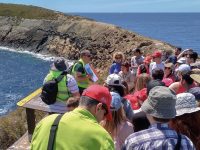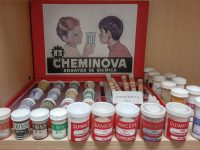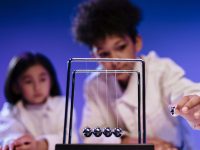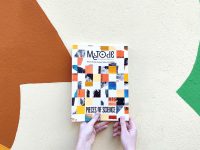Interview with Elizabeth Rasekoala
Spinning a web to change minds
Chemical engineer and president of African Gong
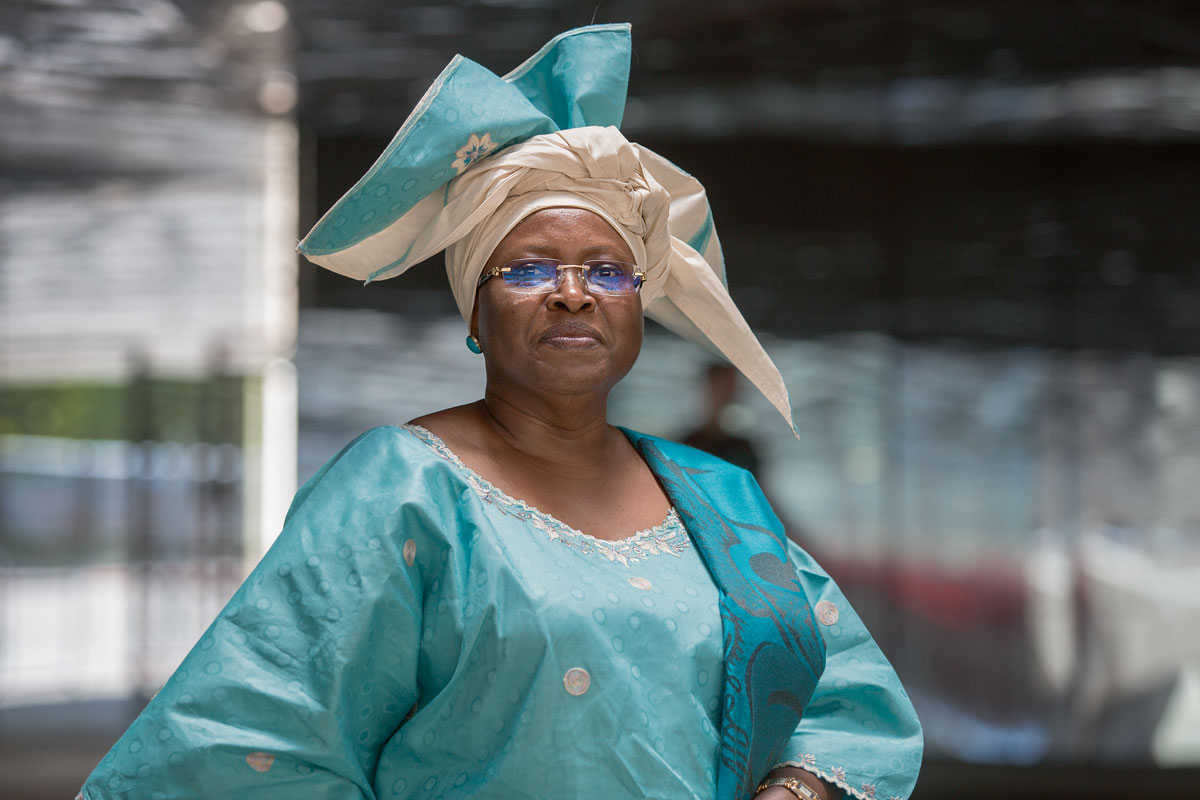
Elizabeth Rasekoala was born in Nigeria. She worked in chemical engineering for two decades in Europe, Africa, and America. During this time, Elizabeth Rasekoala noticed the white, male, eurocentric perspective permeating the world of science. This triggered her commitment with inclusion, which she developed in three different areas: research, the leading of organizations such as African Gong (the Pan-African Network for the Popularization of Science and Technology) – among many other initiatives – and advisorsing international organizations like the UN, the European Commission, or the African Union. In her fight for diversity, sociocultural, and gender inclusion, in science learning, practice, and communication in Africa, she has received the Nat Award 2019 of the Natural Science Museum of Barcelona.
You work to communicate scientific knowledge; but whom does such knowledge belong to?
I think when we talk about the pre-slavery and colonialism era, there was a sense that scientific knowledge was much more shared. The Islamic countries championed scientific advancement as a result from fusion and migration. We forget that there was a time when scientific knowledge was not monetized; there was no money on it. It was nothing about money; there was no patent, there was no copyright, there was no venture capitalism, there were no unicorns. It really was for the common good, it was for the greater good, it was about real humanity; it was about empowering humanity, so that might set up that spirit. It was not just in Africa, it was a global mind-set at the time and the whole world benefited from this fusion, and migration, and sharing of scientific knowledge; from different parts of the world, that then sort of found the way to melt within the European space. But then unfortunately it also led to this Eurocentric superiority, without having the humility to accept that their wellness came from knowledge that had come from elsewhere. It is a bit disingenuous for you to keep something that you fuse and now develop some sort of intellectual amnesia to claim that this is something of your own making. I think that it is part of the illegitimacy of the scientific enterprise in our time, of the «corruption» of the scientific system.
What other corruptions exist in the current scientific system?
In those days you did not have monetarization, and you did not have elitism. In those days scientific knowledge was much more widely shared and disseminated. Today’s elitism did not exist. If you want to know how the world works now, some answer: «Oh, I cannot share it because I have a patent» or «You have to pay me for my copyright». That is why I liked Toledo so much, because of the richness, the heritage. It was so inspiring; you saw the moorish architecture, the moorish science, the moorish knowledge, the richness of the moorish period and the fusion around. There I found the roots of the European scientific advancement. They say that the scientific Renaissance began in Italy, but it was born in Toledo.
«Transforming our globalization journey so that it can address specific localities and contents is the biggest challenge that we have not dealt with»
How can we transform today’s society from a Western-focused conscience to a more global knowledge?
I like the way you frame the transition: the transformation needs to go from Western to global. The problem is that globalization in science and its communication has basically just being at the same globalisation Eurocentric package. So, we globalize, but we have not really globalized the contents. It is like a box, the same box is taken it all lover the world, but everything inside the box is the same. We are good at globalization, but transforming the package that we take at the globalization journey so that it can address the specific localities and contents of the different parts of the world is the biggest challenge that we have not dealt with. And that is the issue of transformation of lives, especially in Africa. For us in the African region, it is not even a luxury; it is about life and death, it is that serious that we communicate science. Because they say: «Ah! People are dying of basic diseases that the world has forgotten! Some of that has to do with poor health systems», but a lot of that has to do with just lack of basic scientific literacy and knowledge. We cannot sit in our elitist scientific knowledge ivory towers. We have to go out to meet to the public, we have to go to empower them with that knowledge, so that they change habits and they can use this knowledge in their everyday life to make informed decisions. You cannot take informed decisions when the «package» you receive responds to a different model. It is critical for us, it is a big challenge so people can protect themselves, follow the good lifestyles, all these are critical habits.

Photo: Ana Ponce & Ivo Rovira
How does African Gong work to communicate this knowledge?
We have an executive board which is formed of eight people, and I am pleased to say that there is a good gender balance, roughly four women and four men. Membership is individual as well as institutional, so we have scientists, we work with those who are representatives of the whole African continent, we have representation of the five sub-regions: North Africa, West Africa, Central Africa, East Africa, and Southern Africa. And what we do is work at three levels. The first level is to grow the policy environment, the involvement with policy-makers. If you are not present in the policy document, then you do not exist, and if you are not in the policy document, then there is no funding, there are no resources, and there is no government support. The second level is to look at programme and practice development, how to create innovative African-centred programs that do not just replicate Western examples. How do we treat that box? How can we transform what is inside in terms of program and practices in the African context? And then the third level is what we call «capacity building», working with universities and researchers to run courses on science communication, public engagement, etc. We basically give them the tools, the knowledge, the environment so they can be better at science communication and public engagement within an African context.
«At African Gong, we try to create innovative African-centred programs that do not just replicate Western examples»
The fundamental framework you develop is inclusion. Where do you start?
Inclusion starts with a mind-set that relies on three very important things. The first is to convince scientists that they have to be accountable for whatever they do. Because all we do is with the license and the privilege of society, so we must have that humility and a care to be held accountable. I think one of the points is the kind of thing we started to do after the 2014 Ebola crisis in the African Conference for Ebola, in which several African countries participated, where scientists partnered with experts and public health practitioners and specialists. The goal was to inculcate science communication practices and public engagement in to the mainstream of public health mechanisms, so that we can both partners do a more better job of communicating and engaging the public long before there is a crisis, because what we find is that our poor public health system seems to be reactive to crisis, rather to be proactive. How do we deal with foundations, trusts with these communities; how can we get them to know us, and how can we know them; so when we have to tell them very difficult things, very challenging things that may be contradict some of their cultural norms or practices, and do so in a way that is this affirmative, but yet it is transformative. This is a real practical challenge that we are now working with public health professionals and medical professionals how to address. But it is not easy, because they also have their baggage, and science communicators are not perfect either, we have also our own blind spots, so we try to work together to learn to do a better job together.
How do you develop the scientists’ capacities?
Part of what de courses are about is to capacity built African researchers, so that they have the confidence, the knowledge and the capacities to move to those villages. Because what we are founding is that we try to solve a problem by giving people the tools. So, the way we say is that rather giving them fish, doing it for them, we are teaching them how to fish. So they are teaching how to do their work better. And we find that when they have the training, when they have the capacity, they have the confidence to go in these places to engage in public enrolment. Whereas when they do not what they are supposed to do, they tend to shy away, and some people are not confident enough with other people. The work we do is to build up confidence, to make them feel comfortable about doing up their job and engaging with the public. Capacity building is very important because, unfortunately, and I know it may be a bit better in Europe, but our university degree courses, our post-graduate courses, master’s and PhDs include nothing about «science communication». You basically have a degree in science, in research in engineering, but nobody teaches you anything about how to communicate science. In African Gong, we are trying to fill that gap. While they are doing their master’s, or PhD, they can have short three-day courses to do capacity building. So that by the time they get the PhD or the master’s degree, they also have the tools to undertake science communication.

Photo: Ana Ponce & Ivo Rovira
How do you manage to involve every member of an institution?
Leaving aside what I call «project syndrome». You have to institutionalize, so that it becomes the responsibility of everybody in the institution, not only those who are leading a project. When you have an institutional approach it means that everyone from the CEO from the teamers, to the janitors, to the lady in the job center, everybody [she forcefully taps on the table] has a responsibility toward inclusion. It is a change in paradigm. Inclusion and communication are not just a project from some department in the science center, it is an entire institutional framework. You have an interesting example in a science center in the UK that actually wrote these guidelines in the personal worksheet of every person in the institution, from the CEO backwards. That is powerful, so that everybody is addressing that. Once you make it a statement to move from projects to the institutionalization model, you create a whole different kind of momentum, a whole different kind of dynamics. The background idea is simple: we are not a project, we are an entire institutional issue. Women are not a problem to be solved, no! We are an institutional matter. Generalizing goals, the minds change and try to include all segments of society.
«We are very inclusive in language. We work with the four common working languages in Africa, but there are also African indigenous languages»
How do you make sure that knowledge reaches every social segment?
When you understand the humility that is around accountability to society, then you are led to the next question: «Who is the society?» «Who makes off this society?» I cannot just choose on segment of society and say «Well, this the part of society to whom I want to be accountable». That is wrong. The society is about man and women, people are from different ethnicities and races, so the first step is to have this mental wiring about accountability in front of society. Then you are led to break it down, to analyze and understand that you have to be accountable to all these segments, always asking the same set of questions: «If I organize an event, who is joining? Who speaks? Who does not? Who comes? Who does not, and why?» Interpreting what you do, you begin to think in what I call the framework approach, which naturally becomes a habit. So, just as those bad habits of exclusion become a way of life, inclusion can develop more habits, so that in time you are actually doing it instinctively. We also practice language diversity. We are very inclusive in language. We do not want to recreate what happened with English in a continent where there are so many other languages. We work with francophone African countries, lusophone African countries, and Arabic countries in Africa, which are the four common working languages in Africa, but there are also African indigenous languages.
How do you make sure you do not leave anyone behind?
Once you have a program and objectives, you need to have real indicators. So, let us put down «key performance indicators» to know whether we are an inclusive institution on gender, on race, on people with disabilities, etc. In short, to make sure that the target groups participate. In each of those we do not generalize, we specialize. Key performance indicators measure if you are doing well. If in two years’ time we want to reach the target that 50% of the people who come into our science center are from a specific community or origin, indicators let you know if you are walking toward that goal. A science center somewhere in Italy set the goal to have the proportion of people that came into their center reflect the same proportion of minorities as in the population of the city, and they managed to do so.
How can we make scientific information reach rural areas effectively?
Every community has their leaders, they have the women, especially the older women who are very active, who are well respected in the community, who have built their foundational leadership and trust, who are very excellent gatekeepers, and I say that in the best possible way. They really are entering points into their communities. We need to find them, we need to nudge them, we need to work with them.

Photo: Ana Ponce & Ivo Rovira
What is the best channel to reach as many people as possible?
The problem we find with the cell phones is that, yes, everybody may have one, but Internet access is very limited on the continent. We found that doing things in the internet and social media really means we are speaking to a very small amount of people. If you really want to get to the ordinary people, especially in the rural area, use the radio. And the good thing of radio is that you can do things in different languages.
How do you structure radio programming?
What we do is to try to do is what we call multidisciplinary discussions. We would have a scientist together with one of these community leaders on a radio program to talk about some of these local issues, so the scientist in that process is disseminating communicating from the scientific perspective, but in an empowerment a framing way with the person from the community. For example, for climate change, the scientist is talking CO2 and the person in the community does not understand. But they can inform: «In my grandfather’s days we did not have so many mosquitoes. But now the mosquitoes are there nine months of the year.» The scientist is talking about all kinds of scientific phenomena, the person on the ground is putting it into real terms. People in the village are noticing climate change, they are very close to nature. You do not have to talk to them about climate change. We do not give these people this kind of esoteric scientific discourse about CO2 emissions, about the Anthropocene. Excuse me, but who knows about the Anthropocene in my village? No one, but we do know that the rains are not coming; we know there are more mosquitoes. That is what we are trying to do with these kinds of discussions. We partner the scientist with the local calls to share the knowledge. And we find that you can do that very nicely in radio, and it is low cost. It is cheap. You just go to the studio and talk! And you can do it in the indigenous languages.
«Scientists need to adapt their language. If they discuss climate change and CO2, no one in the community will understand»
Radio is very interactive.
Exactly! You have phone in calls. It is so great, so interactive. We know that people may not have the money to call a friend, but they would call in to the radio because they want to leave their comment or they want to give their point of view. Radio gives a real opportunity for people to phone in and ask questions and engage in a way that you do not get with any other media, so we encourage the scientists to use the radio when we do the capacity sessions in the local stations. Community stations are very accessible, always looking for programs. And community radio programs are very good. Especially because they are not driven for money; community radio stations tend to be driven by volunteers, who are just happy to create content, so they give us a lot of opportunities. Communicating in the radio can be very powerful.
How would you approach the commitment to inclusion in international organizations’ outreach efforts?
I think the best thing that these international institutions can do for inclusiveness is to mobilize their members around these issues. I think is very difficult just to leave individuals or institutions to deal with it on their own. We all need solidarity. And with the human aspect of international professional networks, you can see institutions and individuals suddenly feeling a bit more confident to talk about all these issues, coming up with ideas, working together. The first thing is to mobilize, considering quality rather than quantity. Do not get fixated about numbers. Even if you start with few institutions, you will grow: build it and they will come. This is what I see that has happen to the ECSITE advocacy groups [European network of science centres and museums]. We started being just a dozen institutions and now it is growing, and every year it is growing. Sharing the weight of the dissemination of scientific knowledge makes it easier. In solidarity and mobilization, coalitions are very important.

